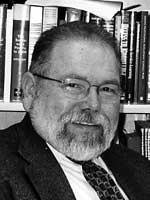 University Dean at City
University of New York: Nicholas Michelli
University Dean at City
University of New York: Nicholas Michelli
by Joan Baum, Ph.D
In a way, the University Dean for
Teacher Education at The City University of New York (CUNY)
Dr. Nicholas M. Michelli has been preparing for this position—which includes a
joint appointment as Professor in the University’s Ph.D.
program in Urban Education—all his life, bringing to
it a long interdisciplinary career in public policy and teacher
education. Although Dr. Michelli retains the title of professor
and dean emeritus at Montclair State University, where he served
as Dean of the College of Education and Human Services for
20 years, his head and heart are clearly centered on the “challenge” of
overseeing education at the 10 senior colleges and 6 community
colleges that constitute the nation’s largest public
urban university. He talks about his “vision” for
the New York City schools with an enthusiasm that borders on
mission but draws on years of practical and political expertise.
Masters work at NYU in African Studies,
followed by a doctorate at Teacher’s College, Columbia University, fired Dr.
Michelli’s sense of wanting to connect education with
national endeavor, he says. The creation of a democratic nation
should reflect and direct the role of education, he believes.
Historically, the purposes of urban education have been confused.
Yes, higher performance on standardized tests is important
but this is not the “purpose” of education, it
is only an “indicator.” The purposes of education
have “moral dimensions” to them, and an element
of social justice. Education must be for all children “the
vehicle by which they will find their way.” Children
must finally see themselves “as having the ability to
create knowledge instead of seeing it passed on to them.” This
means, he says, that children will have good economic opportunity;
that they will have rich and fulfilling lives; and that they
will become active and empathic participants in our democracy.
His job? To ensure the very best preparation of teachers and
principals who will instill these purposes.
The timing is good. The first class
of teachers to be graduated under the new state certification
standards in 2004 will move into the classrooms with a major
in a subject area. Of course, he points out, New York City
is an “abstraction”;
the reality is that the New York City education system is an
amalgam of different school districts. Changing the system
means changing schools a district at a time. Competition will
eventually mean survival of the fittest but with a sense of
what’s appropriate for each district. There are, for
example, approximately 75 different math programs in the schools
and any number of ways to teach literacy. What works? With
CUNY colleges partnering with neighboring schools, it will
be easier to tell. The dean’s got a lot of promising
initiatives under way—“balanced literacy,” for
instance, which focuses on comprehension with phonics and other
skills taught in the context of meaningful learning, includes
healthy doses of both phonics and reading comprehension.
Dr. Michelli is especially energized
by the challenge of getting 11,000 certified teachers into
the classrooms by September 2003. He smiles, the eyebrows
go up but the voice more than suggests he is determined to
recruit and retain. Approximately 50 percent of new teachers
have been on the job for less than 5 years. The dean is understandably
critical of past policy to assign novices and uncertified
teachers to the more challenged schools. He is also shrewdly
optimistic about what higher salaries may effect. His particular
charge, he says, is to provide the best possible educators
and then support them with professional development wherever
it’s needed. He points with pride
to particular initiatives in teacher preparation such as “cultural
passports,” which he hopes will connect the colleges
(both senior and community colleges) with institutions all
over the city that may enhance curricula, along with a long
standing commitment to work with the Lincoln Center Institute
and the American Museum of Natural History. The passport is “a
great idea,”he says, and suggests how many poorer urban
school districts are a lot like rural districts in being deprived
of opportunities to expose prospective teachers to the arts.
Another initiative noted by Dr.
Michelli is an idea launched by philanthropist and former
CUNY Board of Trustees Vice Chairman Edith Everett—a “school operating officer” program
which provides a kind of chief operating officer who will oversee
various non-academic matters in the schools, such as bus schedules,
cafeteria, and testing, thus freeing up principals to assume
full pedagogical leadership. Also high on the dean’s
list is two-way audio/video conferencing between schools and
colleges that will allow teacher preparation classes to observe
in real time “the real world.” And then, of course,
there is the continuing connection of colleges with their community
schools, probably at the heart of improving teaching preparation.
The discussion with the dean barely
touches on other connections, many of which have to do with
his determination to ensure strong support at federal, state,
and city levels for enacting the promises of urban education.
More than once, he articulates his belief that the fate of
the city, of the country, depends on the success of the city’s
public schools. A published author on the subject, a member
of various professional boards and committees, and an award
winner for his dedication to teacher education, Dean Nicholas
Michelli, a former social studies teacher and a semi-pro
drummer (with a recent gig at a major conference with his
CUNY Graduate School colleagues), is prepared to meet the
beat of the times. Maybe even set it.#
